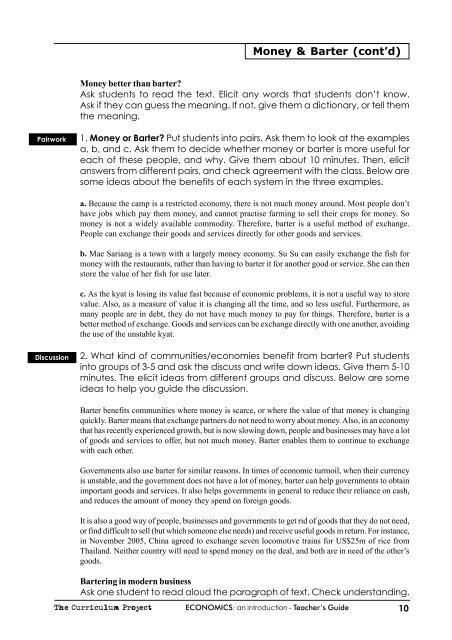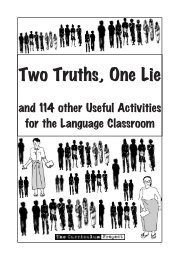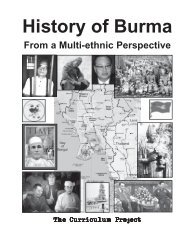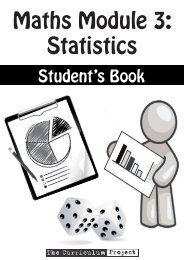Teacher's Guide - The Curriculum Project
Teacher's Guide - The Curriculum Project
Teacher's Guide - The Curriculum Project
- No tags were found...
Create successful ePaper yourself
Turn your PDF publications into a flip-book with our unique Google optimized e-Paper software.
Money & Barter (cont’d)Money better than barter?Ask students to read the text. Elicit any words that students don’t know.Ask if they can guess the meaning. If not, give them a dictionary, or tell themthe meaning.Pairwork1. Money or Barter? Put students into pairs. Ask them to look at the examplesa, b, and c. Ask them to decide whether money or barter is more useful foreach of these people, and why. Give them about 10 minutes. <strong>The</strong>n, elicitanswers from different pairs, and check agreement with the class. Below aresome ideas about the benefits of each system in the three examples.a. Because the camp is a restricted economy, there is not much money around. Most people don’thave jobs which pay them money, and cannot practise farming to sell their crops for money. Somoney is not a widely available commodity. <strong>The</strong>refore, barter is a useful method of exchange.People can exchange their goods and services directly for other goods and services.b. Mae Sariang is a town with a largely money economy. Su Su can easily exchange the fish formoney with the restaurants, rather than having to barter it for another good or service. She can thenstore the value of her fish for use later.c. As the kyat is losing its value fast because of economic problems, it is not a useful way to storevalue. Also, as a measure of value it is changing all the time, and so less useful. Furthermore, asmany people are in debt, they do not have much money to pay for things. <strong>The</strong>refore, barter is abetter method of exchange. Goods and services can be exchange directly with one another, avoidingthe use of the unstable kyat.Discussion2. What kind of communities/economies benefit from barter? Put studentsinto groups of 3-5 and ask the discuss and write down ideas. Give them 5-10minutes. <strong>The</strong> elicit ideas from different groups and discuss. Below are someideas to help you guide the discussion.Barter benefits communities where money is scarce, or where the value of that money is changingquickly. Barter means that exchange partners do not need to worry about money. Also, in an economythat has recently experienced growth, but is now slowing down, people and businesses may have a lotof goods and services to offer, but not much money. Barter enables them to continue to exchangewith each other.Governments also use barter for similar reasons. In times of economic turmoil, when their currencyis unstable, and the government does not have a lot of money, barter can help governments to obtainimportant goods and services. It also helps governments in general to reduce their reliance on cash,and reduces the amount of money they spend on foreign goods.It is also a good way of people, businesses and governments to get rid of goods that they do not need,or find difficult to sell (but which someone else needs) and receive useful goods in return. For instance,in November 2005, China agreed to exchange seven locomotive trains for US$25m of rice fromThailand. Neither country will need to spend money on the deal, and both are in need of the other’sgoods.Bartering in modern businessAsk one student to read aloud the paragraph of text. Check understanding.<strong>The</strong> <strong>Curriculum</strong> <strong>Project</strong> ECONOMICS: an introduction - Teacher’s <strong>Guide</strong>10













![[Eng] Nov 2012 DRAFT - The Curriculum Project](https://img.yumpu.com/45590859/1/184x260/eng-nov-2012-draft-the-curriculum-project.jpg?quality=85)


